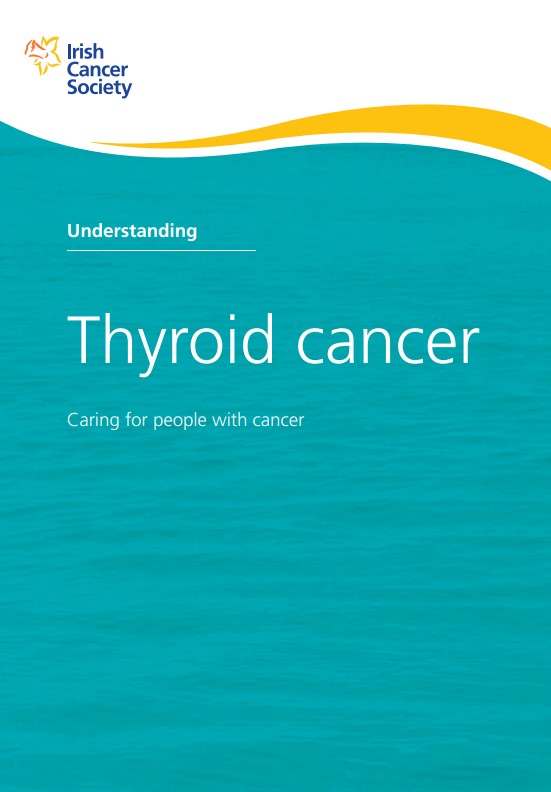Thyroid cancer
Treatment
How is thyroid cancer treated?
Treatment for thyroid cancer includes surgery, radioactive iodine therapy and thyroid hormone therapy. The right treatment plan for you will depend mainly on the type of thyroid cancer you have and the stage of your cancer. Your doctor will recommend the best treatment for you.
Surgery for thyroid cancer
The aim of surgery is to remove the cancer and the area close to it. Surgery is the most common treatment for thyroid cancer. There are different ways of doing surgery for thyroid cancer. The best type for you will depend on the stage of your cancer.
A small cut in the centre of your neck is usually made to get directly at your gland. If any tissue is left behind after surgery, you might need radioiodine therapy later.
Your surgeon might need to remove some of the tissues in the area around the thyroid gland if you have anaplastic thyroid cancer or if the cancer has begun to spread outside the thyroid gland.
This is removing just one lobe of the thyroid.
Your surgeon might remove some or all of the lymph nodes close to your thyroid gland during your thyroid cancer surgery. These can be examined under a microscope to see if cancer has spread to them or not. Removing the lymph nodes is called a lymphadenectomy or a neck dissection. As many as possible of the nodes are removed to prevent the cancer from coming back.
Side-effects of thyroid surgery
With all surgeries there is a small risk of bleeding and infection.
It is also common to feel tired or weak for a few weeks after your surgery. The time it takes to heal is different for everyone.
You will have a small scar across the front of your neck just above your collar bone. The scar will look red or dark at first but will fade with time. It is usually very neat and hardly noticeable.
Other possible side-effects
Sometimes there may be slight damage to the nerves to the voicebox (larynx). This can make your voice sound hoarse and weak. In most cases it a temporary problem, but it can be permanent for a very small number of people.
You will have regular blood tests to check the calcium levels in your blood. If needed, your doctor will prescribe calcium, and possibly vitamin D, for you until the levels are normal again. Let your nurses know if you have muscle cramps, numbness or tingling in your hands, feet or around your mouth, as this can be a sign of low calcium.
You may experience some neck stiffness for a few days to weeks after your surgery. Your doctor will prescribe painkillers to help with this.
After surgery, you will no longer have a thyroid gland to make the hormones your body needs, so you will need to take thyroxine tablets. This is called thyroid hormone therapy or hormone replacement therapy.
Radioactive iodine therapy
This therapy can destroy tiny amounts of normal thyroid tissue or cancer cells, if any, left behind after surgery. It is usually given after surgery for papillary or follicular thyroid cancer. It reduces the risk of the cancer recurring or spreading elsewhere. You may have to wait several weeks to recover after surgery before having this treatment.
Not all patients need radioactive iodine therapy. You will be referred to a specialist centre for this treatment if you need it.
Thyroid hormone therapy
If your thyroid gland has been removed you will need thyroid hormone therapy to replace the thyroid hormone.
Taking thyroid hormone also reduces the amount of thyroid-stimulating hormone (TSH) in your body, which can stop any surviving thyroid cells from working and help to prevent the cancer coming back.
You will be given the replacement drug for life, usually thyroxine, which is also called T4.
Without these hormones you would develop signs and symptoms of an underactive thyroid. This is called hypothyroidism. Signs of it include weight gain, tiredness, dry skin and hair, and physical and mental slowness.
Most people only need to take the drug once a day but at the same time. It may take some months to find the correct dosage for you. As a result, you will have blood tests to check your hormone levels regularly.
Taking thyroid hormone can keep TSH levels very low. This can prevent thyroid cancer developing. You may be given thyroid hormone if only part of your thyroid gland is removed. TSH will be kept low for at least 1 year after radioactive iodine therapy or until you complete the surveillance testing.
Side-effects of thyroid hormone therapy treatment
- Too much thyroid hormone: Weight loss, and feeling hot and sweaty, a fast heart rate, chest pain, cramps and diarrhoea. In the long term, it can cause weak bones (osteoporosis).
- Too little thyroid hormone: Weight gain, feeling cold and tired, and dry skin and hair.
If you have any side-effects, do tell your doctor or nurse. Your doctor can do a blood test to make sure you are getting the right dose of thyroid hormone.
Coping with side-effects
The type of side-effects you get will depend on the type of treatment, the dose, the duration and your own general health.
Your doctor or nurse will discuss any possible side-effects with you before your treatment. We have more information about coping with the side effects of treatment.
Treating metastatic thyroid cancer
Metastatic or advanced thyroid cancer means the cancer has spread beyond the thyroid, to other parts of your body.
If you have metastatic thyroid cancer, your doctor will aim to slow down the growth of the cancer and reduce or relieve any symptoms you have.
Treatment includes chemotherapy, targeted therapies and radiotherapy. Or you may be suitable for a clinical trial.
Continue reading about thyroid cancer




Get help & support

Support Line
Free support pack


